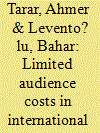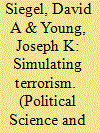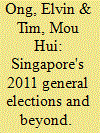| Srl | Item |
| 1 |
ID:
165440


|
|
|
|
|
| Summary/Abstract |
Why do intergovernmental organizations (IGOs) that espouse democratic commitments suspend the membership of some states that backslide on those commitments, while leaving that of others intact? We argue that a combination of geopolitical factors and institutional rules help explain this inconsistent pattern. Remaining member states insulate geopolitically important states—particularly those with large endowments of oil resources—from suspension. Institutional factors, such as voting rules and the size of the IGO, create veto points that reduce suspensions. Using an original global data set of IGO suspensions and charter commitments from 1980 to 2010, we find strong support for our argument. We test a key assumption of existing scholarship that claims IGOs serve as credible-commitment devices for political reform and democratization. We show that once a state becomes an IGO member, it can often remain in the IGO even after violating its democratic commitments.
|
|
|
|
|
|
|
|
|
|
|
|
|
|
|
|
| 2 |
ID:
110009


|
|
|
|
|
| Publication |
2011.
|
| Summary/Abstract |
Economic reconstruction typically takes place after the end of war. Yet recently, economic reconstruction has been viewed as a means to 'win hearts and minds' during ongoing conflict. Drawing on a variety of reconstruction experiences from Afghanistan and Iraq, we identify four 'reconstruction traps' that result from the incentives and constraints faced by actors involved in economic reconstruction during ongoing conflict. These traps include: 1. the credible commitment trap, 2. the knowledge trap, 3. the political economy trap, and 4. the bureaucracy trap. Avoiding these traps is critical for successful economic reconstruction; and we discuss potential strategies for doing so.
|
|
|
|
|
|
|
|
|
|
|
|
|
|
|
|
| 3 |
ID:
125134


|
|
|
|
|
| Publication |
2013.
|
| Summary/Abstract |
Do audience costs have to be extremely large in order to credibly signal resolve and affect international crises? Existing theoretical work on audience costs suggests an affirmative answer, and recent empirical work on audience costs focuses on whether a leader can generate such large audience costs as to create a commitment to fight where no such commitment previously existed. We analyze a richer crisis bargaining model with audience costs and find that (1) audience costs can have war-reducing effects on incomplete-information crisis bargaining through a noninformative, bargaining-leverage mechanism and (2) audience costs can have war-reducing effects even when such large audience costs are not being generated as to create a commitment to fight where no such commitment previously existed. Even more limited audience costs can have war-reducing effects in international crises. We discuss how the bargaining-leverage mechanism is consistent with a number of prominent historical cases
|
|
|
|
|
|
|
|
|
|
|
|
|
|
|
|
| 4 |
ID:
111168


|
|
|
|
|
| Publication |
2012.
|
| Summary/Abstract |
Reciprocal trade agreements (RTAs) have proliferated rapidly in Asia in recent years, an unprecedented phenomenon in a region in which state-led institution-building efforts were largely unsuccessful during the Cold War years. In this article, we investigate the qualitative provisions of RTAs in Asia, focusing on agreements that are professedly geared toward trade liberalization through reciprocal exchanges of trade concessions. We build on the concept of credible commitment- that states "tie their hands" through international agreements and thus signal strong commitment to trade liberalization. We argue that a broad range of agreement provisions will affect an RTA's ability to achieve its primary objective: trade liberalization. We present a coding scheme that measures the strength of a wide variety of provisions in the legal texts of RTAs. Using quantitative analysis, we analyze the impact of various components of Asia's RTAs on participants' trade flows.
|
|
|
|
|
|
|
|
|
|
|
|
|
|
|
|
| 5 |
ID:
098249


|
|
|
|
|
| Publication |
2009.
|
| Summary/Abstract |
We present two simulations designed to convey the strategic nature of terrorism and counterterrorism. The first is a simulated hostage crisis, designed primarily to illustrate the concepts of credible commitment and costly signaling. The second explores high-level decision making of both a terrorist group and the state, and is designed to highlight scarce-resource allocation and organizational dynamics. The simulations should be useful both in a traditional classroom setting as well as to the larger public. We provide a primer on the subject matter, and all the material necessary to run the simulations.
|
|
|
|
|
|
|
|
|
|
|
|
|
|
|
|
| 6 |
ID:
133770


|
|
|
|
|
| Publication |
2014.
|
| Summary/Abstract |
We introduce the concept of a "credibility gap" to explain why the Workers' Party has been more successful than other opposition political parties in recent elections in Singapore. We argue that opposition parties need to overcome a credible commitment problem with the electorate in order to win against hegemonic parties.
|
|
|
|
|
|
|
|
|
|
|
|
|
|
|
|
| 7 |
ID:
143904


|
|
|
|
|
| Summary/Abstract |
Developed mainly in the broad field of negotiation, the existing literature on international business negotiation has adopted theoretical perspectives that focus on differences between negotiating parties. In this article, we argue that opportunism is more fundamental than differences in our understanding of international business negotiation behavior. Parties’ concerns over how to mitigate opportunism are the fundamental force that drives such negotiation behavior, and the likelihood of opportunism is affected mostly by the economic nature of the asset parties committed to the business exchange. By synthesizing transaction cost economics and new institutional economics, this paper develops an alternative theoretical model that complements the existing negotiation literature to explain negotiation behavior. Our model theorizes relationships between parties’ ex-ante credible commitments and ex-post dispute resolution strategies and explores how institutions moderate such relationships in shaping international business negotiation behavior and process.
|
|
|
|
|
|
|
|
|
|
|
|
|
|
|
|